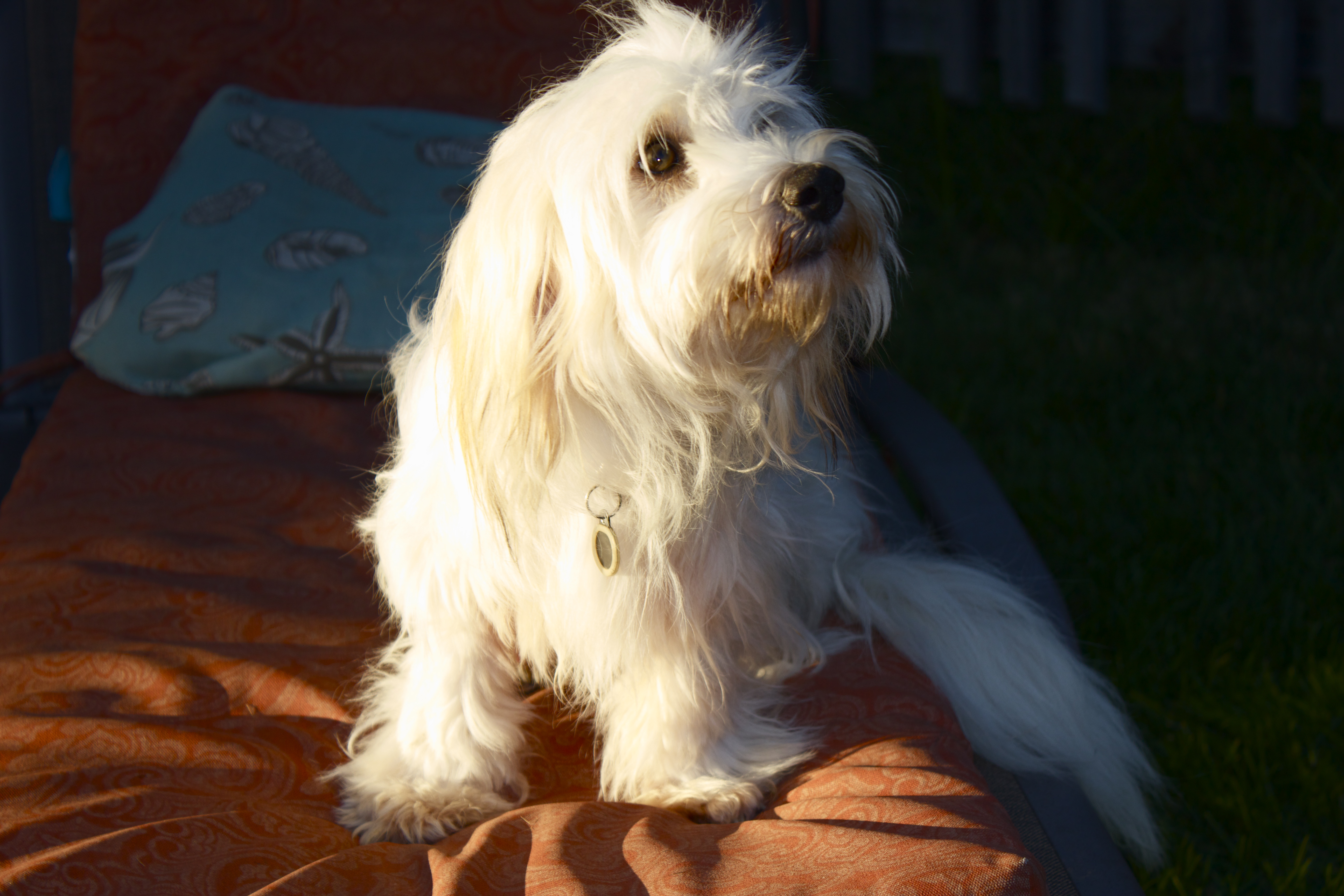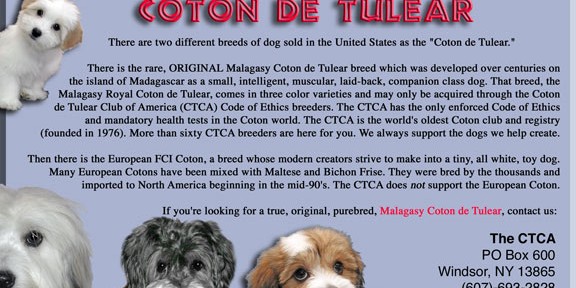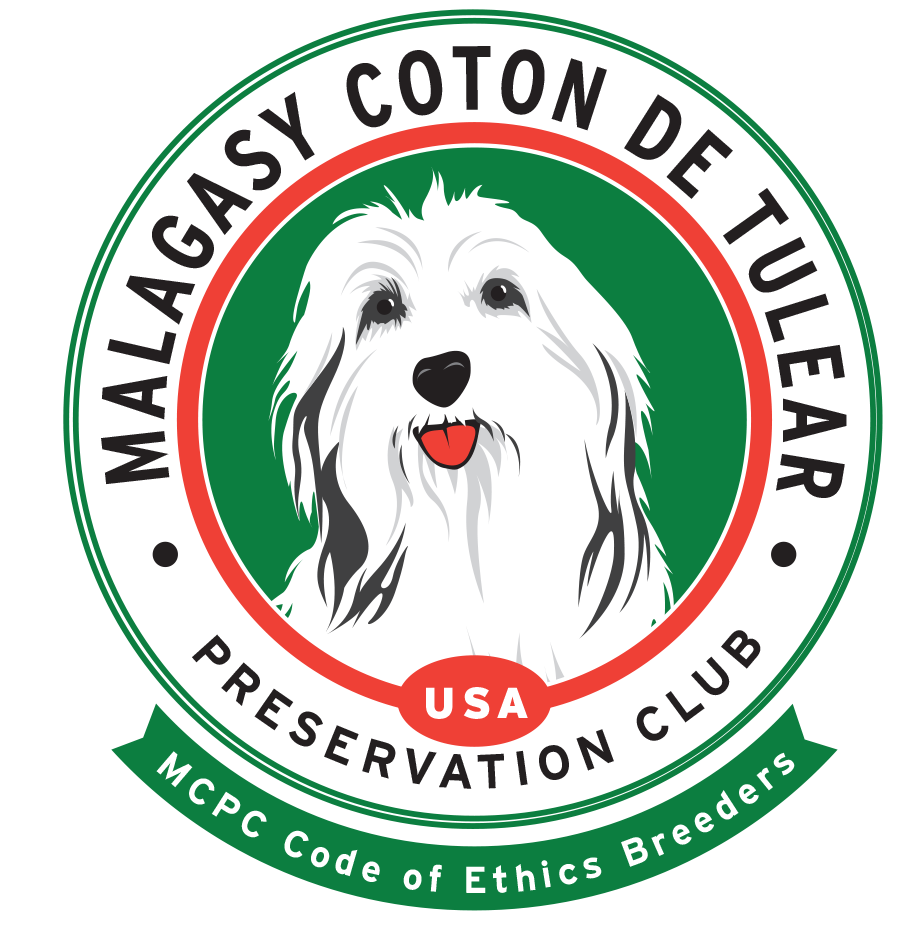Are all Cotons the Same?
There are two very different breeds of dogs currently sold in the United States
as “Cotons de Tulear.” There is the very rare ORIGINAL Malagasy Coton de Tulear,
a breed developed over centuries on the Island of Madagascar as a small,
intelligent, engaging, powerfully muscular, laid-back companion-class dog. This
breed comes in three color varieties and the lineage and genetics have been
safeguarded.The Coton de Tulear Club of America (CTCA), has been breeding and
protecting these Malagasy Cotons for the last 35 years, and now the MCPC (The Malagasy Coton Preservation Club) is continuing to breed and protect the gene pool and health of the Malagasy Coton. A Malagasy Royal Coton de Tulear can be acquired through the MCMP Code of Ethics breeders.
Then there is the “Euro” or “French” FCI Coton, a breed whose modern creators strived to make into a tiny, all white toy dog extremely close in appearance to a Maltese. In fact, many of these French Cotons were bred with the Maltese and Bichon Frise, and later with the Havanese, bred by the thousands and imported into America during the mid-1990s. These are NOT the Original Coton de Tulear.
This is a very important distinction if you are looking for the purebred Malagasy Coton de Tulear, blessed with all of its wonderful traits, genetic and health soundness, wonderfully calm dispositions, clownish personalities, and devoted companions, whose wonderful traits have been preserved through the CTCA and MCPC.
The following is a description of the Malagasy Coton de Tulear:
The Coton de Tulear, pronounced “coe-TAWN day TULE-ee-r,” means “cotton of Tulear.” The Coton is a rare, ancient pure-breed that originated on Madagascar more than three centuries ago. Cotons are very intelligent, easy to toilet train, and uncommonly gentle and laid back. They get along well with children and most pets. The Coton was exclusively the dog of Royal Malagasy nobles, but now this exceptional, elegant companion is available in North America from MCPC breeders.
The Coton stands between about 9.5 and 13-inches (24 to 33 cm) tall at the withers (shoulders). (Note: a taller variety of Coton is known, but has yet to be described with a standard. A standard Coton is little more than two feet long (0.6 m), and weighs between 9 and 18 pounds (8.2 kg). A Standard Coton de Tulear averages about 14 pounds. They have dark, engaging eyes, black lips, and a medium-length muzzle tipped with a black nose.
The Coton de Tulear earned its name from its unique, cotton-like hair, and for a port city in Madagascar, Tulear. Its dry, wind-tossed coat is probably the easiest to maintain of any long-haired breed, but it still requires regular grooming. The hair is
about four-to-six inches long, dries quickly when wet, and requires relatively
little brushing. It sheds very little, and rarely bothers people who
suffer from chronic allergies.
There are three handsome color varieties: White (often with champagne color patches); Black-and-white; and Tri-color. A Tri-color adult is mostly white with champagne patches and a faint, irregular “dusting” of black hairs. Black & White Cotons, retain their beautiful color throughout their lives.
Cotons are hearty dogs and, with acclimation, frolic in desert heat and winter snow. However, the Coton is strictly an indoor dog. The breed is extremely healthy, long-lived, and, in the North American population of Cotons. They live about 16 years (15.7 years on average); the oldest survived for almost 19 years.
Probably the most outstanding characteristic of the Coton de Tulear is its behavior. The Coton is a “companion dog,” bred for the pure delight of its intelligent, loving attention to its human family. It is very intelligent, and studies its human family with great care. The Coton is an alert, lively companion, but it is slow to anger. Most Cotons bark seldom, although some will act as alarm clocks and guard dogs. A Coton usually snuggles in the lap or rests close by .
Cotons are calm, sturdy dogs, most of whom enjoy the well-intentioned rough-housing of children. Cotons enjoy most household pets including other dogs and cats. A Coton may cock its head attentively when spoken to, smile, and stand or walk on its hind legs to please its human family. Cotons are easily trained. A Coton quickly becomes a family member and retains a puppy-like joy throughout its long life.



